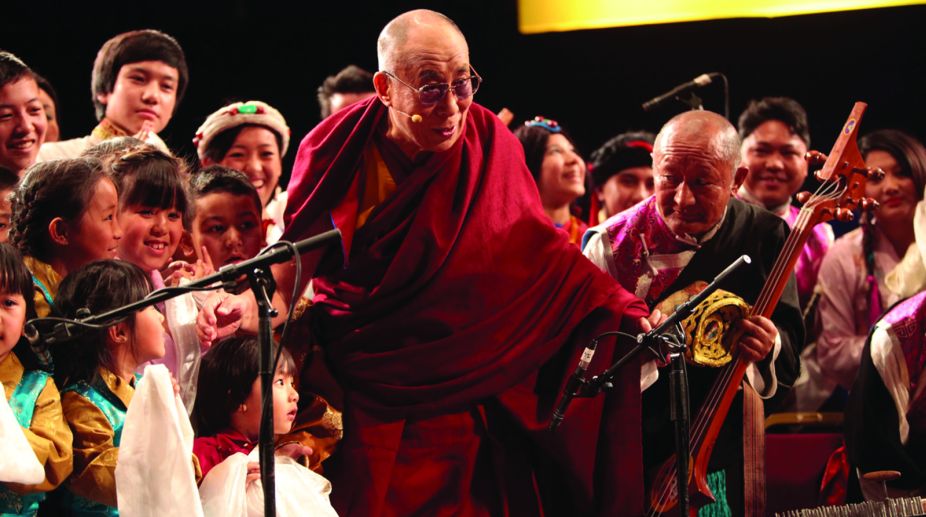PM spells out India’s position on China
I n a recent interview to Newsweek, the Prime Minister, discussing Indo-China relations, commented, “For India, the relationship with China is important and significant.

Dalai Lama
Although the observance of the Dalai Lama’s 60th year of exile in India cannot be a cause for celebration because of the Tibetan pontiff’s decision to leave his homeland in 1959 thanks to the threat posed to the lives and liberty of the inhabitants by the invading Chinese, the momentous event nevertheless underlines a remarkable feature of Indian society and politics.
There are hardly any other examples in world history of a group of people belonging to one country being compelled to take up residence virtually on a permanent basis in another country because living in their own country on their own terms became impossible.
What is more, India has provided shelter to the people fleeing persecution twice ~ once in the 8th century when the Zoroastrians fled from Persia following the invasion by Muslims to take shelter in India to save their lives and culture; and, again, in the 20th century when the Tibetans escaped from their Himalayan home when the Chinese entered their country.
Advertisement
The Parsis have become an integral part of Indian society after 12 centuries in the country and the Tibetans may well follow suit unless China collapses under its own authoritarian weight and the escapees can return to their motherland.
In the meantime, India can take pride over the fact that it is the preferred destination of large groups of oppressed people obviously because the land of Buddha and Asoka is seen as a benevolent, accommodative country.
The diamond jubilee of the Dalai Lama’s stay in India should have been an occasion, therefore, for India to showcase its glorious heritage of being a large-hearted, benign country where the “aliens” can feel as safe as the natives, living freely to pursue their religion and culture in harmony with the rest of the population. This is a high reputation of which virtually no other country can boast, least of all China.
Yet, the Narendra Modi government decided to go into a shell when the Tibetans suggested that the 60th year of the Dalai Lama’s sojourn in India should be marked by an all-faith prayer meeting in Rajghat, Mahatma Gandhi’s samadhi, along with several other meetings, including one devoted by them to saying “thank you” to India.
Following verbal communications from the government ~ understandably, no written orders ~ the Tibetan government-in-exile has decided to hold these meetings in Dharamshala, where the Dalai Lama usually stays when he is in India, while Indian officials have been instructed to stay away.
The reason why the Modi government has distanced itself from the Tibetan plans is to keep China in good humour. As the foreign secretary, reputedly a “China hand”, has explained, the present sensitive nature of Sino-Indian relations requires India to play its cards carefully so as not to offend the fire-breathing dragon next door.
Since the mutual ties have been sensitive ever since the 1962 Chinese invasion, it is difficult to guess when they will be “non-sensitive” enough to allow India to acknowledge the Dalai Lama’s presence without looking over the shoulder at China.
It is possible that New Delhi’s present coyness is intended to ensure that Modi’s forthcoming visit to China goes off without a hitch. The defence minister, Nirmala Sitharaman, is also scheduled to go to Beijing soon.
But there have been similar visits by Modi and others to China without India having to bend over backwards to please Beijing. What is the reason, therefore, for the present timidity? Is it Xi Jinping’s metamorphosis into a Middle Kingdom emperor for life? Or the possibility of China finding another semi-democratic ally like Pakistan in the Maldives? Or the construction of helipads, sentry posts and trenches by China in Doklam, suggesting that it cannot be dissuaded from asserting its rights to a “disputed” territory as a few months ago when India displayed unusual boldness in confronting the usurpers?
The government’s present diffidence is a replay of an earlier occasion when the Dalai Lama was summoned to the Prime Minister’s residence late in the evening to be told to keep India’s sensitiveness vis-à-vis China in mind. It was an encounter which reportedly left the Tibetan spiritual leader “shaken”.
He had never been treated so shabbily by any other previous government, which had always been unfailingly courteous towards this self-proclaimed “son of India” and is regarded by an overwhelming majority of Indians as an honoured guest.
It will be a mistake, however, for the government to assume that its present diffidence will make the Chinese amenable to Indian concerns about its backing in the UN for the Jaish-e-Mohammed terrorist, Masood Azhar, or be less aggressive in its forays into Indian territory in the border areas.
The Chinese are not impressed by a timorous attitude. Instead, they will regard it as just the kind of behaviour they expect from a weaker country.
If India does not want to go down in their estimation, it should not be afraid of letting Beijing know that the acceptance of the Chinese occupation of Tibet does not mean that India will treat those who escaped the dishonour of living under the yoke with disrespect.
The Modi government claims to be a far stronger, nationalistic entity than its predecessor. In no other field of geopolitics is the need for demonstrating its strength greater than on the Tibetan issue.
The writer is a former Assistant Editor, The Statesman
Advertisement